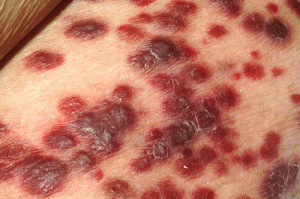It is a known fact that the vulnerability of men towards skin cancer is more than women, although the reasons for this gender bias were unknown. New studies in this regard have brought to light that men are more prone to contracting this kind of cancer because the level of antioxidants in their bodies is less than that of women. The study was carried out by researchers of Richard J. Solove Research Institute, Arthur G. James Cancer Hospital under the Ohio State University Comprehensive Cancer Center. Studies were carried out on mice and it has come to light that low levels of vital antioxidants in the skin of male are responsible for the cancer.
Female mice, which have a higher level of antioxidants called catalase, are protected from this kind of cancer. Catalase is a natural protector against skin cancer because it inhibits chemicals such as hydrogen peroxide that are responsible for causing cancer. Harmful ultraviolet rays (UVB) present in the sun also cause generation of certain compounds that damage DNA and lead to skin cancer. Catalase acts against these compounds as well and protects the body from cancerous cells. New studies in the recent times have also established a relationship between skin cancer and catalase antioxidant. The study goes on to say that men suffer a higher level of oxidative stress due to the deficiency of the antioxidant. Co-leaders of the study are assistant professor of molecular virology, immunology and medical genetics, Gregory Lesinski and Tatiana Oberyszyn.

Another important revelation from the study is the increased risk of exposure to UVB, which generated myeloid derived suppressor cells. These are a group of white blood cells and the UVB caused these to flow out of the bone borrow and into the exposed parts of the skin. It was found that the number of these cells that were displaced were higher in make mice when compared to female mice. This is the first time that a concrete scientific proof of white blood cell migration has been brought to light and the fact that these could trigger cancer cells in some way. This discovery also means that the white blood cell groups could result in the formation of a tumor in the skin instead of only being a trigger for cancer. These cells are normally suppressed in the body when there is a need to speed up healing. Cancer cells can grow more freely since there is less immunity in play.